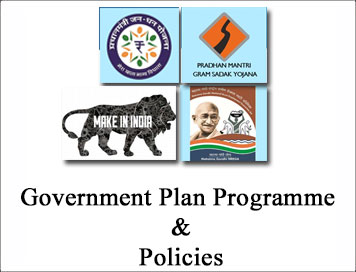Government Plan Programme Policies for UPSC Exam: DIGITAL India

Government Plan Programme Policies for UPSC Exam
:: DIGITAL India ::
Digital India has been envisioned as an ambitious umbrella programme to transform India into a digitally empowered society and knowledge economy. This programme has been envisaged and coordinated by the Department of Electronics and Information Technology (DeitY). There is also a collaboration with various Central Ministries and State Governments. The Prime Minister of India is the chairman of the monitoring committee of Digital India programme. All the existing and ongoing e-Governance initiatives have been revamped to align them with the principles of Digital India. It takes together a large number of ideas into a single comprehensive plan so that each of them remain a part of larger goal.
The vision of Digital India is centred on three key areas -
-
Digital Infrastructure as a Utility to Every Citizen:- This vision will include several intiatives like High speed internet, Mobile banking enabling participation in financial sphere, safe and secure cyber space, easy access to common services etc.
-
Governance & Services on Demand- This vision includes government services available in real time from online and mobile ptalform, services digitally transformed for ease of doing business, integration between different departments, financial transactions should be made electronic and cashless etc.
- Digital Empowerment of Citizens- This vision includes initiatives such as Digital literacy, Universally accessible digital resources, All documents available in Indian languages,portability of all entitlements through cloud etc.
In order to fulfill the above visions nine pillars of Digital India programme has been designed. These pillars include;
- Broadband Highways;
- Universal Access to Mobile Connectivity;
- Public Internet Access Programme;
- E-Governance: Reforming Government through Technology;
- eKranti - Electronic Delivery of Services;
- Information for All;
- Electronics Manufacturing: Target Net Zero Imports;
- IT for Jobs and
- Early Harvest Programmes.
Each pillar has individual targets. In universal access to mobile conectivity target is to cover 42,300 uncovered villages by 2018. Under public internet access programme post offices to be made multi-service centres with in 2 years. Similarly under e-kranti pillar targetis to provide free wifi in all schools, provide mobile banking, e-courts, e-jails and online medical consultation etc. Under Information for all citizens will have open and easy access to information as well as government will pro-actively engage through social media. IT for jobs will target training 1 crore students in smaller towns and villages for IT sector jobs also telecom service providers will try to train rural workforce to cater their own needs.

